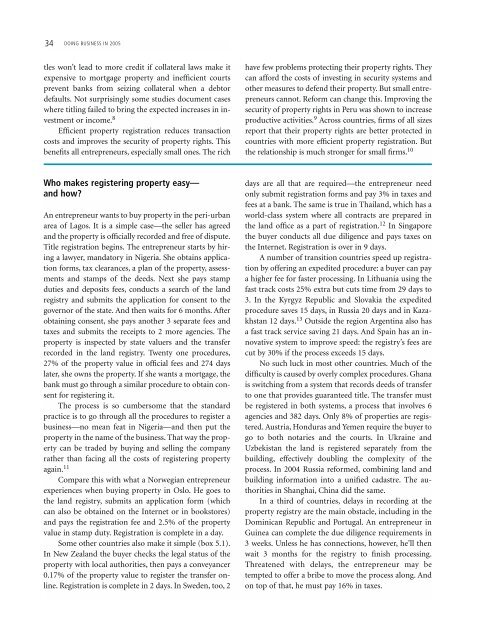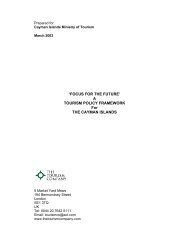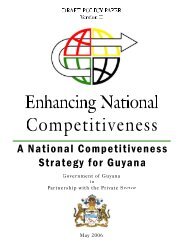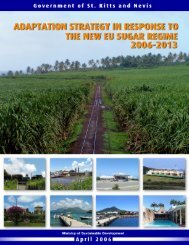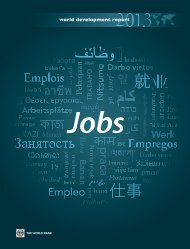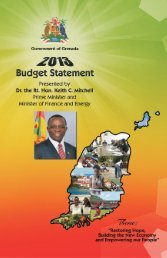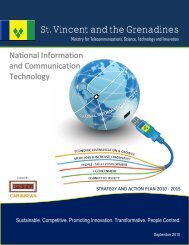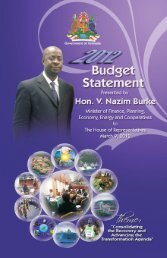Business Removing
Doing Business in 2005 -- Removing Obstacles to Growth
Doing Business in 2005 -- Removing Obstacles to Growth
- No tags were found...
You also want an ePaper? Increase the reach of your titles
YUMPU automatically turns print PDFs into web optimized ePapers that Google loves.
34 DOING BUSINESS IN 2005<br />
tles won’t lead to more credit if collateral laws make it<br />
expensive to mortgage property and inefficient courts<br />
prevent banks from seizing collateral when a debtor<br />
defaults. Not surprisingly some studies document cases<br />
where titling failed to bring the expected increases in investment<br />
or income. 8<br />
Efficient property registration reduces transaction<br />
costs and improves the security of property rights. This<br />
benefits all entrepreneurs, especially small ones. The rich<br />
have few problems protecting their property rights. They<br />
can afford the costs of investing in security systems and<br />
other measures to defend their property. But small entrepreneurs<br />
cannot. Reform can change this. Improving the<br />
security of property rights in Peru was shown to increase<br />
productive activities. 9 Across countries, firms of all sizes<br />
report that their property rights are better protected in<br />
countries with more efficient property registration. But<br />
the relationship is much stronger for small firms. 10<br />
Who makes registering property easy—<br />
and how?<br />
An entrepreneur wants to buy property in the peri-urban<br />
area of Lagos. It is a simple case—the seller has agreed<br />
and the property is officially recorded and free of dispute.<br />
Title registration begins. The entrepreneur starts by hiring<br />
a lawyer, mandatory in Nigeria. She obtains application<br />
forms, tax clearances, a plan of the property, assessments<br />
and stamps of the deeds. Next she pays stamp<br />
duties and deposits fees, conducts a search of the land<br />
registry and submits the application for consent to the<br />
governor of the state. And then waits for 6 months. After<br />
obtaining consent, she pays another 3 separate fees and<br />
taxes and submits the receipts to 2 more agencies. The<br />
property is inspected by state valuers and the transfer<br />
recorded in the land registry. Twenty one procedures,<br />
27% of the property value in official fees and 274 days<br />
later, she owns the property. If she wants a mortgage, the<br />
bank must go through a similar procedure to obtain consent<br />
for registering it.<br />
The process is so cumbersome that the standard<br />
practice is to go through all the procedures to register a<br />
business—no mean feat in Nigeria—and then put the<br />
property in the name of the business. That way the property<br />
can be traded by buying and selling the company<br />
rather than facing all the costs of registering property<br />
again. 11<br />
Compare this with what a Norwegian entrepreneur<br />
experiences when buying property in Oslo. He goes to<br />
the land registry, submits an application form (which<br />
can also be obtained on the Internet or in bookstores)<br />
and pays the registration fee and 2.5% of the property<br />
value in stamp duty. Registration is complete in a day.<br />
Some other countries also make it simple (box 5.1).<br />
In New Zealand the buyer checks the legal status of the<br />
property with local authorities, then pays a conveyancer<br />
0.17% of the property value to register the transfer online.<br />
Registration is complete in 2 days. In Sweden, too, 2<br />
days are all that are required—the entrepreneur need<br />
only submit registration forms and pay 3% in taxes and<br />
fees at a bank. The same is true in Thailand, which has a<br />
world-class system where all contracts are prepared in<br />
the land office as a part of registration. 12 In Singapore<br />
the buyer conducts all due diligence and pays taxes on<br />
the Internet. Registration is over in 9 days.<br />
A number of transition countries speed up registration<br />
by offering an expedited procedure: a buyer can pay<br />
a higher fee for faster processing. In Lithuania using the<br />
fast track costs 25% extra but cuts time from 29 days to<br />
3. In the Kyrgyz Republic and Slovakia the expedited<br />
procedure saves 15 days, in Russia 20 days and in Kazakhstan<br />
12 days. 13 Outside the region Argentina also has<br />
a fast track service saving 21 days. And Spain has an innovative<br />
system to improve speed: the registry’s fees are<br />
cut by 30% if the process exceeds 15 days.<br />
No such luck in most other countries. Much of the<br />
difficulty is caused by overly complex procedures. Ghana<br />
is switching from a system that records deeds of transfer<br />
to one that provides guaranteed title. The transfer must<br />
be registered in both systems, a process that involves 6<br />
agencies and 382 days. Only 8% of properties are registered.<br />
Austria, Honduras and Yemen require the buyer to<br />
go to both notaries and the courts. In Ukraine and<br />
Uzbekistan the land is registered separately from the<br />
building, effectively doubling the complexity of the<br />
process. In 2004 Russia reformed, combining land and<br />
building information into a unified cadastre. The authorities<br />
in Shanghai, China did the same.<br />
In a third of countries, delays in recording at the<br />
property registry are the main obstacle, including in the<br />
Dominican Republic and Portugal. An entrepreneur in<br />
Guinea can complete the due diligence requirements in<br />
3 weeks. Unless he has connections, however, he’ll then<br />
wait 3 months for the registry to finish processing.<br />
Threatened with delays, the entrepreneur may be<br />
tempted to offer a bribe to move the process along. And<br />
on top of that, he must pay 16% in taxes.


